|
|
|
Sort Order |
|
|
|
Items / Page
|
|
|
|
|
|
|
| Srl | Item |
| 1 |
ID:
124389
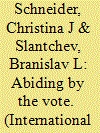

|
|
|
|
|
| Publication |
2013.
|
| Summary/Abstract |
We analyze institutional solutions to international cooperation when actors have heterogeneous preferences over the desirability of the action and split into supporters and opponents, all of whom can spend resources toward their preferred outcome. We study how actors can communicate their preferences through voting when they are not bound either by their own vote or the outcome of the collective vote. We identify two organizational types with endogenous coercive enforcement and find that neither is unambiguously preferable. Like the solutions to the traditional Prisoners' Dilemma these forms require long shadows of the future to sustain. We then show that cooperation can be sustained through a noncoercive organization where actors delegate execution to an agent. Even though this institution is costlier, it does not require any expertise by the agent and is independent of the shadow of the future, and thus is implementable when the others are not
|
|
|
|
|
|
|
|
|
|
|
|
|
|
|
|
| 2 |
ID:
113824
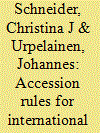

|
|
|
|
|
| Publication |
2012.
|
| Summary/Abstract |
Powerful states often accept unanimity voting on accession to international institutions, even though this enables weak states to blackmail powerful states into providing costly side payments. Whereas the literature attributes this choice mainly to efforts to bolster the legitimacy of international institutions, the authors demonstrate that the choice of unanimity also has a strategic component. The authors formally show that unanimous accession rules can profit powerful states by creating uncertainty as to the minimal level of reform that enables accession. If accession is valuable enough and the membership candidate is uncertain about the resolve of weak states, it plays safe by implementing ambitious reforms that improve the efficacy of the international institution. In this case, a legitimacy-efficacy trade-off does not exist: the unanimity rule enhances legitimacy while allowing powerful states to induce significant reforms by applicants to the benefit of current members.
|
|
|
|
|
|
|
|
|
|
|
|
|
|
|
|
| 3 |
ID:
170028


|
|
|
|
|
| Summary/Abstract |
Political corruption is rampant in—and destructive to—many parts of the world. A growing number of international organizations (IOs) claim to address the problem by encouraging good governance norms and rules, such as anti-corruption standards and practices. Whether membership in IOs dampens corruption, however, is unclear. Our central argument is that the characteristics of IO membership determine both whether corruption is tolerated and the extent to which formal anti-corruption rules effectively combat the problem. First, groups of corrupt states are reticent to enforce good governance norms or rules against other IO members, rendering punishment for corruption incredible. Second, leaders may witness the value of corruption to their IO peers and learn to act the same way. Using a variety of data sources and estimation strategies, including new data on IO anti-corruption mandates, we demonstrate that: (1) countries that participate in member-corrupted IOs are significantly more likely to engage in corruption themselves—and experience an increase in corruption over time—than are countries that participate in less corrupt IOs; and (2) this tolerance for corruption occurs even within IOs that have adopted formal anti-corruption mandates, rendering good governance rules largely cheap talk among organizations governed by corrupt principles.
|
|
|
|
|
|
|
|
|
|
|
|
|
|
|
|
| 4 |
ID:
119636
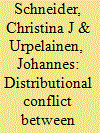

|
|
|
|
|
| Publication |
2013.
|
| Summary/Abstract |
Why do states ratify international treaties? While previous research has emphasized domestic political factors, we focus on power politics in situations in which powerful states disagree on the merits of a treaty. We argue that states supporting the status quo should discourage third parties from ratifying the treaty, whereas challenger states should entice them to do so. Based on this theory, we expect third parties' ratification decisions to be influenced by their dependence on the conflicting states. To test the theory, we use data on the conflict between the United States and the European Union over the regulation of trade in genetically modified organisms. The European Union created a new treaty, the Cartagena Protocol, to enhance biosafety regulation and propagate the "precautionary principle" over the "sound science principle" defended by the United States. Our quantitative analysis shows that ratification decisions of third parties were influenced by relations to and dependence on the clashing giants.
|
|
|
|
|
|
|
|
|
|
|
|
|
|
|
|
| 5 |
ID:
158374
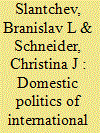

|
|
|
|
|
| Summary/Abstract |
International cooperation can fail even though governments have no distributional conflicts or incentives to free-ride, face no informational or credibility problems, and even agree on the policies that need to be implemented. Germany's refusal to cooperate with the Eurogroup members on the Greek bailout in 2010 until the crisis threatened to derail the entire Eurozone is puzzling in that regard especially because Germany is the main beneficiary of the euro. It was alleged at the time that this was a dilatory tactic designed to postpone a domestically unpopular decision until after crucial regional elections. But why would voters allow themselves to be misled like that? And why did Merkel agree to the bailout before the elections took place? To analyze how citizen preferences affect international cooperation, we develop a game-theoretic model of the four-way interaction between two governments that must coordinate a response to a crisis affecting both countries but who also must face the polls domestically with an electorate that might be uncertain whether a response is necessary. We find that, paradoxically, governments that stand to receive the greatest benefits from international cooperation face the greatest obstacles to implementing the required policies even when voters would want them to. We show how the model can rationalize Merkel's electoral strategy and why her party suffered at the polls when the strategy went off the rails.
|
|
|
|
|
|
|
|
|
|
|
|
|
|
|
|
| 6 |
ID:
121908
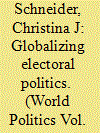

|
|
|
|
|
| Publication |
2013.
|
| Summary/Abstract |
This article analyzes electoral cycles in distributional bargaining in the European Union. The author argues that governments attempt to increase their EU membership benefits above average levels in the preelection period, hoping to appear politically competent to voters. The theory discusses when and how EU members can increase these gains before elections through negotiations in the Council of Ministers. A time-series cross-sectional analysis of EU member states' annual budget negotiations from 1977 to 2006 supports the existence of conditional electoral cycles in distributional bargaining and generally points to the importance of accounting for such cycles when analyzing patterns of international cooperation.
|
|
|
|
|
|
|
|
|
|
|
|
|
|
|
|
| 7 |
ID:
119644


|
|
|
|
|
| Publication |
2013.
|
| Summary/Abstract |
This paper analyzes multilateral aid allocation in the European Union (EU). We argue that EU members can influence the aid allocation process toward their national interests if they form powerful coalitions that bias the European Commission's development policies. When EU members' preferences over aid allocation are heterogeneous, the Commission can implement multilateral aid according to its programmatic goals. Greater homogeneity of EU members' goals, however, increases the likelihood that members can form powerful interest coalitions and induce the Commission to allocate aid according to their own national interests. The empirical analysis provides robust support for our theoretical argument, and the findings generally indicate that interest coalitions play an important role in multilateral aid allocation.
|
|
|
|
|
|
|
|
|
|
|
|
|
|
|
|
| 8 |
ID:
128969
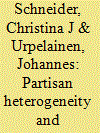

|
|
|
|
|
| Publication |
2014.
|
| Summary/Abstract |
This article analyzes the relationship between partisan heterogeneity and cooperation in international organizations. We argue that partisan heterogeneity increases distributional conflict among states during intergovernmental negotiations, thereby increasing the costs of cooperation. This decreases governments' willingness to contribute to cooperative efforts. We test the theory against data on governments' financial contributions to the European Development Fund. The empirical analyses robustly demonstrate that partisan heterogeneity reduces governments' incentives to contribute to European cooperation on international development. On a more general level, we offer new perspective on the role of domestic politics in international cooperation.
|
|
|
|
|
|
|
|
|
|
|
|
|
|
|
|
| 9 |
ID:
171164


|
|
|
|
|
| Summary/Abstract |
IMF loans during times of financial crisis often occur in conjunction with bilateral financial rescues. These bilateral bailouts are substantial in size and a central component of international cooperation during financial crises. We analyze the political economy of bilateral bailouts and study the trade-offs that potential creditor governments experience when other countries find themselves in financial distress. Creditor governments want to stabilize crisis countries by providing additional liquidity, particularly if the crisis country is economically or politically important to them, but they are constrained by domestic politics. Politicians aim to balance these countervailing pressures. They provide bailouts when their own economy is exposed to negative spillover effects and when the crisis country is important for geostrategic, military, or political reasons. Domestic economic and political constraints, on the other hand, limit their ability to bail out other countries. We test our hypotheses using an original data set on bilateral bailouts by the G7 countries to countries that experienced financial crises between 1975 and 2010. The findings of our statistical analysis support our theoretical argument and contribute to a deeper understanding of international cooperation's complex structure during financial crises.
|
|
|
|
|
|
|
|
|
|
|
|
|
|
|
|
| 10 |
ID:
163279


|
|
|
|
|
| Summary/Abstract |
Many international organizations channel financial contributions of their member countries through other international organizations to implement their programs and activities. In this context, the second step of the delegation chain is often costly and—at least seemingly—an easily avoidable duplication of a previous one. We examine the puzzling phenomenon of double delegation in the context of European aid. We argue that governments engage in double delegation in order to strengthen the role of the European Union (EU) as a multilateral donor agency. This leads to an increase in the flow of resources that, at times, exceeds what the Commission can effectively handle alone. Delegating aid to other organizations helps the Commission solve this capacity problem, but it also reduces its control over how the resources are spent. Consequently, the Commission must exercise judgment about which projects it delegates to other international organizations. Our quantitative and qualitative evidence shows that double delegation is more likely where the Commission's capacity as an aid donor is low and where EU members have no strategic interests at stake. We also show that the Commission tries to mitigate the loss of control by earmarking the delegated aid projects more tightly, notably when member preferences are heterogeneous. The results provide a new way of thinking about international delegation and bureaucratic politics in international organizations. Delegation problems may occur even if the interests between the principal and the agent align. Our approach highlights why this happens and how actors try to minimize the costs of this understudied type of agency slippage.
|
|
|
|
|
|
|
|
|
|
|
|
|
|
|
|
| 11 |
ID:
151275


|
|
|
|
|
| Summary/Abstract |
How do governments distribute their foreign aid resources across international development organizations (IDO)? We argue that governments’ distributional choices across IDOs derive from their attempt to minimize the costs of delegation and to pursue their own interests in foreign aid policy. Governments make decisions about the allocation of resources across a large number of IDOs, and they delegate their scarce aid resources to IDOs that pursue development policies in line with their own foreign development interests. We use data on the financial contributions of 22 OECD governments to 12 IDOs from 1970 to 2008 to test our argument. We find strong support for our claims. Governments regularly contribute to a large number of IDOs, and they tend to delegate more resources to IDOs that provide higher levels of portfolio similarity. The findings suggest that governments can benefit from the increasing complexity of the system of international organizations. It allows them to minimize the loss of control they experience when delegating sovereignty to international organizations.
|
|
|
|
|
|
|
|
|
|
|
|
|
|
|
|
| 12 |
ID:
105878
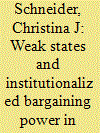

|
|
|
|
|
| Publication |
2011.
|
| Summary/Abstract |
A Stata replication package can be obtained from the author's Web page. I thank two anonymous reviewers, Josephine Andrews, David Armstrong, Scott Desposato, Mark Fey, Erik Gartzke, Hein Goemans, Peter Gourevitch, Katharina Holzinger, Mareike Kleine, Daniel Kono, Hartmut Lenz, Dirk Leuffen, Matthew Loveless, Zeev Maoz, Heather McKibben, Andy Moravcsik, Frank Schimmelfennig, Gilles Serra, Ben Shepherd, Branislav Slantchev, Randy Stevenson, Randy Stone, Dustin Tingley, Jennifer Tobin, Ingeborg Toemmel, Piero Tortola, Camber Warren, Matt Winters, and Langche Zeng for invaluable comments. I also received helpful comments from presentations at European Studies Association Conference (Los Angeles), Nuffield College (Oxford), Princeton University, University of California (Davis), University of Rochester, Rice University, University of California (San Diego), and University of Konstanz. This research project was supported by the Max Planck Society and the German Research Foundation. Ilka Ritter provided valuable research assistance. The usual disclaimer applies
|
|
|
|
|
|
|
|
|
|
|
|
|
|
|
|
| 13 |
ID:
107807
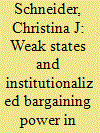

|
|
|
|
|
| Publication |
2011.
|
| Summary/Abstract |
When and how can weak states increase their bargaining leverage in international organizations? I argue that during phases of routine bargaining, distributional outcomes depend on the states' political and economic leverage and less on the formal allocation rules, so they are unfavorable to weak states. This changes in phases of extraordinary bargaining, which are occasioned by significant reform such as enlargement. States that expect distributional conflict from enlargement can threaten to block accession negotiations and increase their membership benefits even if they are politically weak. Statistical and qualitative analyses of distributional bargaining in the European Union support the theoretical claims.
|
|
|
|
|
|
|
|
|
|
|
|
|
|
|
|
|
|
|
|
|